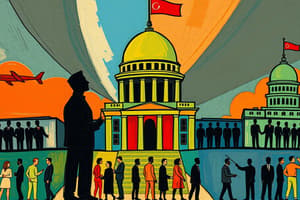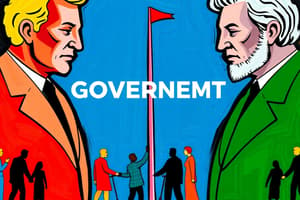Podcast
Questions and Answers
What is the main characteristic of a representative democracy?
What is the main characteristic of a representative democracy?
- Absolute control held by one individual over the government
- Elected representatives making decisions on behalf of citizens (correct)
- Direct participation of all citizens in decision-making
- Lack of checks and balances in the government structure
What distinguishes a dictatorship from a democracy?
What distinguishes a dictatorship from a democracy?
- Citizens have the right to participate in voting
- One person holds absolute control over the government (correct)
- Power is distributed among multiple representatives
- Checks and balances prevent abuses of power
In what type of system do citizens have the right to participate directly in every decision?
In what type of system do citizens have the right to participate directly in every decision?
- Direct democracy (correct)
- Dictatorship
- Theocracy
- Monarchy
Which form of democracy allows efficient decision-making without requiring all citizens to participate directly?
Which form of democracy allows efficient decision-making without requiring all citizens to participate directly?
What distinguishes direct democracy from representative democracy?
What distinguishes direct democracy from representative democracy?
What is a key challenge of direct democracy?
What is a key challenge of direct democracy?
What characterizes a parliamentary system of government?
What characterizes a parliamentary system of government?
What distinguishes a dictatorship from a monarchy?
What distinguishes a dictatorship from a monarchy?
In which form of government do citizens directly vote on all issues without intermediaries?
In which form of government do citizens directly vote on all issues without intermediaries?
What distinguishes a parliamentary system from a presidential system?
What distinguishes a parliamentary system from a presidential system?
What is a potential drawback of a dictatorship compared to a representative democracy?
What is a potential drawback of a dictatorship compared to a representative democracy?
How does voter apathy impact direct democracies and representative democracies differently?
How does voter apathy impact direct democracies and representative democracies differently?
What makes a monarchy different from a dictatorship?
What makes a monarchy different from a dictatorship?
What is a potential benefit of a parliamentary system over a dictatorship?
What is a potential benefit of a parliamentary system over a dictatorship?
How does voter apathy impact a dictatorship differently from a monarchy?
How does voter apathy impact a dictatorship differently from a monarchy?
Flashcards are hidden until you start studying
Study Notes
Types of Government
The different types of governments reflect the political systems and structures of various countries around the world. There are four main categories: democracy, dictatorship, monarchy, and theocracy. Each type has distinct characteristics and functions within society.
Democracy
In a democratic system, power is held by the people through their elected representatives. Governments are typically structured into three branches with checks and balances to prevent abuses of power. Two notable forms of democracies are representative democracy and direct democracy.
Representative Democracy
Representative democracy involves citizens electing individuals who represent them in a legislature. This form of democracy allows for efficient decision-making without requiring all citizens to participate directly in every decision. It's also known as indirect democracy.
Direct Democracy
Direct democracy gives every eligible citizen the right and opportunity to participate in voting on legislation and other decisions. Switzerland is an example of a country with a strong tradition of direct democracy.
Dictatorship
Dictatorship refers to any political system characterized by autocratic rule where one person holds absolute control over the government. Power in a dictatorship resides with a single individual, such as a president or military leader, rather than being distributed among multiple representatives or institutions like in a democracy.
Monarchy
Monarchy is a form of government based on the leadership of a hereditary monarch or king. In some cases, such as the United Kingdom, there may be a constitutional monarchy, meaning the sovereign reigns but does not wield executive power. Other countries, like Saudi Arabia, have an absolute monarchy where the ruler retains near total authority.
Theocracy
A theocracy is a form of government in which religious leaders hold power, and the state is governed according to religious law. Iran is often cited as a contemporary example of a theocracy due to its Islamic Republic structure. Some religions like Christianity or Islam do not prescribe a specific political order but instead recommend virtues necessary for governance.
Studying That Suits You
Use AI to generate personalized quizzes and flashcards to suit your learning preferences.




